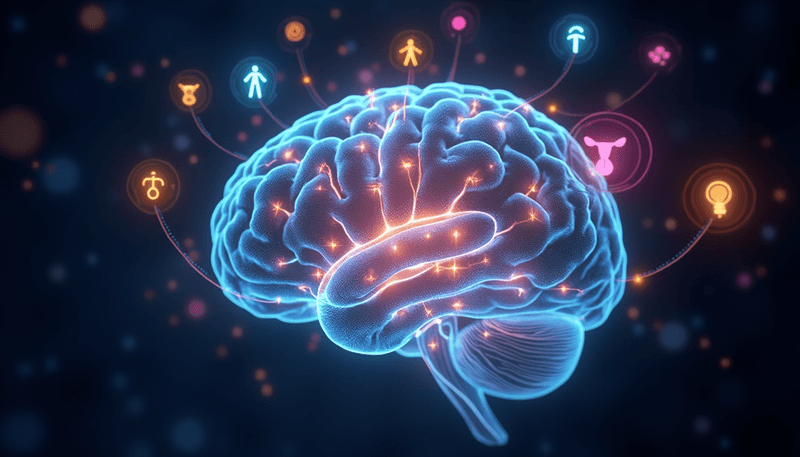Hormone Health: What Women Need Know

Ladies, let's have a heart-to-heart about something that affects us all but we rarely discuss openly: our hormones. As a science communicator, I've delved into the latest research on women's health, and I'm excited to share some game-changing insights with you. Today, we're exploring a fascinating paper from Dr. Steven F. Hotze, which sheds light on how hormones impact our well-being in ways you might not expect.
The Mood-Hormone Connection: More Than Just PMS
Have you ever felt like your emotions were on a roller coaster, and you couldn't figure out why? It turns out, there's a scientific explanation for this, and it's not just in your head. Hormone imbalances can significantly impact our mood and mental health.
Dr. Hotze's research reveals that depression and anxiety are diagnosed twice as often in women as in men. But here's the kicker: these mood disorders often coincide with significant hormonal changes in our lives. Think PMS, postpartum depression, and menopause. It's not just a coincidence!
Let's break it down:
- PMS: Those mood swings? They're triggered by imbalances in estrogen and progesterone.
- Postpartum depression: This can be caused by the dramatic decline in progesterone after giving birth.
- Menopause: As estrogen and progesterone levels drop, mood disorders and anxiety can increase.
Have you noticed changes in your mood that seem to align with hormonal shifts in your life?
But it's not just about these well-known hormonal phases. Hypothyroidism, which affects eight times more women than men, is also closely linked with anxiety and depression. It's like a hidden puppet master, pulling the strings of our emotions without us even realizing it.
So, what can we do about it? The good news is that restoring hormone balance can be an effective treatment. Bioidentical hormone therapy, particularly with estrogen and progesterone, has shown promising results. It's like giving your body the tools it needs to regain emotional equilibrium.
One innovative treatment mentioned in the paper is IASIS Micro Current Neurofeedback. This non-invasive therapy uses low-intensity electrical stimulation to help normalize brain activity patterns. Many women have reported improvements in depression, anxiety, and even insomnia after trying this approach.
Libido and Hormones: It's Complicated (But Solvable!)
Let's talk about something that many of us find uncomfortable to discuss: low libido. If you've ever felt like your sex drive has taken a nosedive, you're not alone. Hormonal changes can have a significant impact on our desire for intimacy.
Dr. Hotze's research points out several hormonal factors that can affect libido:
- Thyroid function: Hypothyroidism can leave you feeling tired and lethargic, which isn't exactly conducive to romance.
- Estrogen and progesterone fluctuations: These hormones play a crucial role in sexual desire, especially during major life events like childbirth, hysterectomy, or menopause.
- Testosterone: Surprise! Women need testosterone too, albeit in smaller amounts than men. It plays a role in our sex drive.
Menopause deserves special attention here. The decline in estrogen can lead to vaginal dryness and discomfort during intercourse. It's like trying to start a car with no oil – things just don't run smoothly.
But don't despair! There are solutions:
- Bioidentical hormone therapy: Balancing estrogen and progesterone can help alleviate menopausal symptoms and boost libido.
- Topical estrogen: For vaginal dryness, this can be a game-changer.
- Testosterone therapy: In small doses, it can help increase desire in women of all ages.
When was the last time you openly discussed your sexual health with your healthcare provider?
Remember, a healthy sex life is an important part of overall well-being. Don't be shy about discussing these issues with your doctor. You deserve to feel vibrant and passionate at any age!
The Weighty Issue of Hormones and Body Composition
Have you ever felt like you're doing everything right – eating well, exercising regularly – but still struggling with weight gain or stubborn fat? Your hormones might be the missing piece of the puzzle.
Dr. Hotze's research highlights a crucial connection between hormones and body composition, particularly for women. Here's what you need to know:
-
Thyroid hormones are metabolism masters: These little powerhouses regulate how fast you burn calories. When your cells aren't getting enough active thyroid hormones (a condition known as hypothyroidism), your metabolism slows down, and weight gain becomes almost inevitable.
-
Estrogen and fat distribution: As we approach menopause, changes in estrogen levels can lead to increased fat storage, especially around the midsection. It's like our bodies are trying to cling onto every calorie!
-
Progesterone's role: This hormone helps balance estrogen and can prevent water retention and bloating.
But here's the real kicker: millions of women are walking around with undiagnosed hypothyroidism. Standard blood tests often miss subtle thyroid imbalances that can still have a significant impact on your weight and overall health.
So, what can you do?
- Ask for comprehensive thyroid testing: Don't settle for just a TSH test. A full thyroid panel can give you and your doctor a clearer picture of your thyroid function.
- Consider bioidentical hormone therapy: Balancing your hormones can make a tremendous difference in your ability to lose weight and maintain a healthy body composition.
- Don't neglect lifestyle factors: While hormones play a crucial role, a nutritious diet and regular exercise are still essential for overall health and weight management.
Have you ever considered that your struggles with weight might be hormone-related rather than just a matter of diet and exercise?
Remember, your body is a complex system, and hormones are like the conductors of a grand orchestra. When they're in harmony, everything runs smoothly. But when they're out of balance, it can affect every aspect of your health, including your weight.
The Importance of Self-Care and Hormone Health
As we wrap up our exploration of hormones and women's health, there's one crucial point that Dr. Hotze emphasizes: the importance of prioritizing self-care. As women, we often put the needs of others before our own, juggling families, careers, and countless responsibilities. But neglecting our own health can have far-reaching consequences.
Here's why taking care of yourself, including your hormone health, is so crucial:
-
You can't pour from an empty cup: When you're running on empty, you can't effectively care for others. Prioritizing your health gives you the energy and focus to tackle all of life's challenges.
-
Hormonal imbalances can snowball: Left unchecked, hormone issues can lead to a cascade of health problems, from mood disorders to weight gain to more serious conditions.
-
Prevention is better than cure: Regular check-ups and addressing hormonal imbalances early can prevent more serious health issues down the line.
So, how can you make your hormone health a priority?
- Schedule regular check-ups: Don't wait for symptoms to become severe before seeing a doctor.
- Listen to your body: Pay attention to changes in your mood, energy levels, weight, and libido. These can be important clues about your hormone health.
- Consider comprehensive hormone testing: A full hormone panel can give you valuable insights into your overall health.
- Explore natural hormone balancing options: From dietary changes to bioidentical hormone therapy, there are many ways to support your hormone health naturally.
- Make time for stress-reduction: Chronic stress can wreak havoc on your hormones. Find activities that help you relax and unwind.
What's one step you can take this week to prioritize your hormone health and overall well-being?
Remember, taking care of your hormone health isn't selfish – it's necessary. By prioritizing your well-being, you're not only improving your own quality of life but also ensuring that you can be there for the people who matter most to you.
In conclusion, our hormones play a vital role in every aspect of our health, from our mood and libido to our weight and overall well-being. By understanding the intricate dance of hormones in our bodies, we can take proactive steps to maintain balance and vitality at every stage of life.
Don't be afraid to advocate for your health and seek out comprehensive hormone testing if you suspect an imbalance. Remember, you know your body better than anyone else. Trust your instincts, ask questions, and work with healthcare providers who take your concerns seriously.
Here's your call to action: This week, take one concrete step towards better hormone health. Whether it's scheduling a check-up, starting a stress-reduction practice, or simply educating yourself further on the topic, every small action can lead to significant improvements in your overall well-being.
Your health is your most valuable asset. Treat it with the care and attention it deserves. After all, a balanced, vibrant you is the best gift you can give to yourself and those you love.

Amelia Grace Okonkwo
Amelia Grace Okonkwo is a freelance health writer and author with over 15 years of experience in health journalism, specializing in women's health and autoimmune disorders. With a background in biology and a Master’s in Public Health from Johns Hopkins, she combines scientific accuracy with a storytelling approach to make health information accessible and empowering. Amelia is known for her bestselling book, "The Skin We're In," which explores autoimmune disorders and their impact. She is passionate about delivering practical health insights for women, addressing topics from midlife wellness to mental health.







